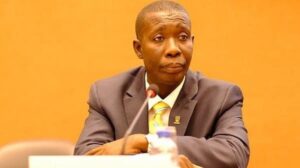
Economist Professor William Baah-Boateng has raised fresh concerns about Ghana’s currency volatility, warning that the frequent appreciation and depreciation of the cedi pose a significant threat to macroeconomic stability and business confidence.
Speaking on the Citi Breakfast Show on Monday, October 20, Prof. Baah-Boateng urged the Bank of Ghana (BoG) to prioritise exchange rate stability over short-term movements, noting that both rapid depreciation and sudden appreciation have ripple effects across the economy.
“Stability is the best. Appreciating and depreciating are not the best,” he said. “When you move from GHC12 to GHC10 so quickly, that’s nearly a 20% swing. It may benefit some sectors in the short term, but the broader economy loses.”
Economic Implications
His analysis highlights a critical point often missed in public discourse — a stronger cedi is not always a good sign. While an appreciating currency might reduce import costs and lower inflation pressures temporarily, it also diminishes export earnings and erodes government revenue denominated in foreign exchange.
May Interest YouGhana’s Modified Taxation Scheme (2025): What You Need to Know
For example, with the recent appreciation from GHC12 to GHC10, Prof. Baah-Boateng noted that cocoa export margins and related government revenues are likely to shrink, as farmers and exporters earn fewer cedis for the same dollar value. In essence, while consumers may briefly enjoy cheaper imports, the real sector—particularly agriculture and manufacturing—suffers.

A Call for Consistent Policy
Prof. Baah-Boateng’s comments underscore the need for the BoG to adopt a steadier, more predictable exchange rate management framework. He cautioned against allowing sharp cyclical movements, such as swings between GHC10.5 and GHC12.5, describing the range as “too wide” and destabilising for economic planning.
“The Central Bank must prevent these large fluctuations. Businesses need predictability to plan investments and pricing,” he emphasized.
Broader Economic Context
His warning aligns with views recently shared by Professor Godfred Bokpin, another leading economist, who has argued that Ghana’s intense focus on the exchange rate—often treating it as a political or symbolic measure—could distract from deeper structural reforms needed to ensure lasting economic stability.
May Interest YouUnderstanding Bonds: A Pathway to Smarter Investing
Prof. Baah-Boateng’s insights reinforce the importance of policy consistency, institutional coordination, and fiscal discipline. Currency stability is not just a monetary goal—it’s a prerequisite for sustainable business growth, investment confidence, and export competitiveness.
A balanced approach that addresses both short-term volatility and long-term structural challenges—including productivity, revenue diversification, and trade competitiveness—will be key to building resilience in Ghana’s economy.


